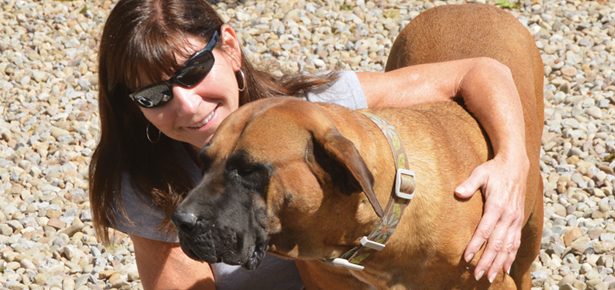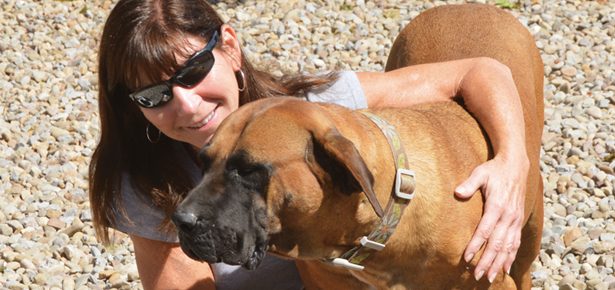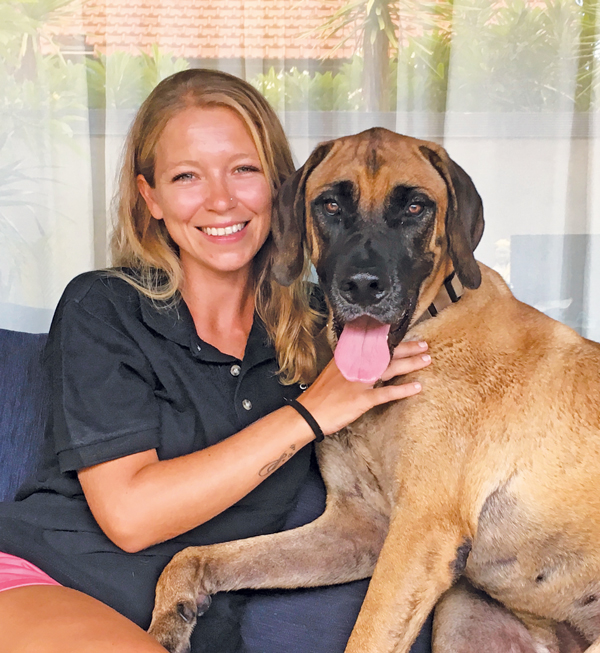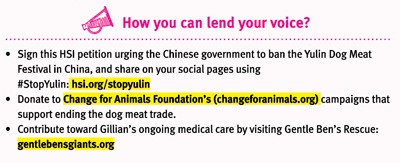

This Mastiff Was Rescued from the Dog Meat Trade
Read her survivor story
At first glance, Gillian is just like any other companion dog—joyful, affectionate, and always accompanied by a wagging tail. She’s tall and broadchested—a Mastiff trait—has soulful eyes, and a gentle mouth that gives the softest kisses. She loves to run, wrestle with other dogs from her pack, sunbathe on the deck, and ponder life’s complexities (or so we like to think) over chew bones. Her fur-bestie is a Cane Corso puppy named Daphne.
But dig a little deeper into her story and you’ll find this gentle giant has suffered atrocities that are most likely beyond anything you or I can comprehend. You see, Gillian is a victim and a survivor of the dog meat trade. She was born and reared on a dog meat farm in South Korea, in a district in the South Chungcheong Province. For her, small pleasures like rolling around in fresh cut grass, chewing on a bone, and getting belly rubs are brand new experiences that are nothing short of miraculous.
What Gillian is familiar with, however, is being a prisoner and suffering intense cruelty at the hands of human beings. Human interactions prior to Gillian’s rescue and rehabilitation often resulted in her being coerced, intimidated, or tortured. Sadly, her plight is not an exception, but the rule for all dogs reared on dog meat farms.
According to the South Korean government figures, more than two million dogs a year are reared on dog meat farms located throughout the peninsula. The dog meat trade is also rampant in China, Vietnam, Indonesia, Cambodia, Laos, and the Philippines, however, these countries largely source their meat from the streets—it’s unthinkable, but the dogs eaten in these countries are often strays and stolen pets. South Korea is the only country known to have established dog meat farms to supply the demand fueled by the erroneous belief that consuming dog meat helps to increase stamina and virility.
Also, unlike its other Asian counterparts like Hong Kong, the Philippines, and Taiwan, where the dog meat trade is banned, the South Korean government has yet to impose a ban.
Gillian’s story prior to her rescue is not for the fainthearted. Dog meat farms are overcrowded and unimaginably filthy. The farms range from backyard enterprises to factory farm-style facilities that house thousands of dogs. Dogs reared on these farms are kept tethered to short ropes or in small, barren cages with wire mesh flooring that offer no padding for their paws. They suffer intense hunger and thirst, are kept in close confinement 24 hours a day, and have little to no room to move around. This, combined with often witnessing the slaughter of other dogs in front of them, puts an enormous strain on them, often crippling them with fear.
Hard as it is to imagine today, Gillian came from a farm no different than the ones described above. The fact that she escaped a violent death—on a farm that is still in business today—is solely because of the timely intervention of her guardian angel and tireless animal advocate, Lola Webber, co-founder of Change for Animals Foundation (CFAF).
Lola first laid eyes on Gillian in July 2015, when visiting dog meat farms alongside Humane Society International (HSI) to assess possible farm closures/conversions to crop based farming. At the time, HSI had just begun their operations to shut down as many dog meat farms as possible, leveraging the critical resources and funding available to them, and partnering up with CFAF to help raise awareness about the dog meat trade. Unfortunately, due to a myriad of reasons, Gillian’s farm was one both organizations were unable to work with.
“I have visited countless farms and walking away from so much misery and knowing what fate awaits the dogs is one of the most heart-wrenching and shameful experiences,” Lola says. “I cry tears of shame and remorse for the dogs and promise them that I have seen them and that they matter to me. But the reality is that we can’t save them all.”
When asked why Lola chose to leave with Gillian when there were countless others she could have saved, Lola’s response is heartrending.
“Sometimes, when your heart has been broken into a million pieces, and you feel like the sadness is going to engulf and destroy you, you make a decision that you can make it right for one life.”
For Lola, that one life on that fateful day was Gillian’s. Gillian’s sad eyes and quiet dignity made it impossible for her to walk away. “The truth is, I bought Gillian off of the farmer that day with every dollar I had,” she admits.
Once Lola was able to ensure Gillian’s safety, she returned to Gillian’s cage to get better acquainted. What she saw up close was soul-destroying. Gillian was painfully thin—her skin sat tight over her ribcage, she could barely stand due to the sporadic use of her legs, and her teats hung almost to the wire mesh flooring—a result of being used over and over again for breeding puppies. Years’ worth of excrement was piled up underneath her cage, and the stench of feces and ammonia hung ripe in the air. None of this deterred Lola as she stepped up to the bars and offered Gillian her hand. For a dog that should have despised human beings, Gillian received Lola by hobbling over and laying her head against her hand, closing her eyes.
Gillian left that day with Lola and has never looked back since. Yet Gillian’s journey forward was anything but easy despite her lucky break. Post-rescue, Gillian was placed with an elderly couple in South Korea for the requisite 30-day quarantine period before she could be flown into the United States. A few days later, the worried couple called Lola to inform her that Gillian had gone into a difficult labour. Worried, Lola immediately dispatched a vet to ensure she made it through her delivery safely. The vet who cared for Gillian was able to save her, but he was sadly unable to save her puppies. Lola later learned that Gillian had given birth to 14 pups.
Once deemed fit to travel, Gillian was put on a plane to San Francisco, where her first stop was the San Francisco SPCA. She spent several months at the shelter receiving urgent medical care for various health complications and learning how to be a dog. With patience and consistent efforts by staff and volunteers, Gillian began to enjoy daily walks, play sessions with other dogs, and positive interactions with humans (with the help of lots of treats and affection).
Gillian’s health, however, was a different story. The shelter vet team discovered complications with her uterus that required further testing for comprehensive answers—testing that was far beyond the scope of what the shelter could offer. They believed her complications might have been a result of multiple pregnancies and a botched C-section while at the farm. Thus Gillian would need to be placed with an experienced family or rescue that could continue to provide her with the medical care she needed to get fully better.
The SF SPCA Animal Partnership and Transfer Associate, Frances Ho, got to work immediately, putting feelers out within the rescue community. Did anyone out there have the resources to provide this gentle survivor with a much needed home to call her own?
Frances’ plea for help was answered by the wonderful folks at Gentle Ben’s Giant Breed Rescue, a rescue that specializes in finding homes for abandoned large breed dogs in need of second chances. Noreen Kohl and her husband, co-owners of the rescue, took one look at the photographs that accompanied Gillian’s story and knew they couldn't turn away. They assured Frances that they were ready to take Gillian in and make sure she received the best medical care possible.
Gillian set off once again to what would be the final leg of her journey. Her reception at the Pittsburg airport was trouble free, and she settled into her new home quickly, even getting off on the right foot with Noreen’s current entourage of rescue dogs. A week after Gillian had time to acclimate, Noreen took her to see an internist for an ultrasound and consultation. The results of the consultation turned out to be shocking. Gillian did not have a bladder at all!
The doctor assured Noreen that despite having no bladder and only one of her kidneys—the lack of either could be hereditary or a result of the botched C-section—Gillian was fully capable of living a normal, healthy life. Yes, she would battle urinary incontinence for the rest of her life, but she would make a wonderful companion regardless. Noreen accepted the challenge of caring for Gillian with grace, and brought her back home.
“Gillian is completely trusting of me,” Noreen says. “She is still a little wary of my husband, but will come up to him now when he’s sitting on the couch. She always comes up to me in the evening when I’m eating because she knows I will always give her a little bite of whatever I eat. She takes things so gently.”
Since having Gillian, Noreen has visited several websites to learn more about the horrific dog meat trade. What she’s seen, she confesses, sickens her. Watching the videos and learning more about the trade has left her with an even deeper respect for her four-legged child, both for Gillian’s capacity to still have faith in humanity and for her endless ability to forgive. “She knows we love her so much, and I think she truly feels at home with us. She finally has a chance to enjoy life.”
Create Change

Unfortunately, these beliefs are what continue to secure support for the trade today, allowing some Korean lawmakers to push for the legalization of the dog meat industry through regulation by classifying certain breeds of dogs as livestock.
However, there is reason to feel hopeful. The recent rise in pet ownership, especially among the younger generations, has vastly helped spur on the growing societal discontent between proponents and opponents of the dog meat industry and there is an increasingly vocal opposition to the trade.
HSI, CFAF and other local activists and organizations are working together to devise approaches to ending the trade for good—in a way that will bring dog meat farmers on board to voluntarily give up their dogs for rehoming and close their farms, establishing crop-based, non-animal farms in their place.
These efforts have met with great success and continue to do so every single day. In 2015 alone, HSI, in tandem with CFAF, closed down four dog meat farms. Over 224 dogs were rescued from these farms and then rehomed. Both organizations hope to continue bringing about more farm closures while simultaneously working to raise the profile of meat dogs to show them as great companions.
With the upcoming 2018 Winter Olympics being held in South Korea, both organizations hope to continue building on the current momentum and use the exposure of the games to garner public support to eventually compel the government to ban the consumption of dog meat once and for all.
Join the newsletter and never miss out on dog content again!
"*" indicates required fields
By clicking the arrow, you agree to our web Terms of Use and Privacy & Cookie Policy. Easy unsubscribe links are provided in every email.

